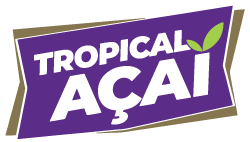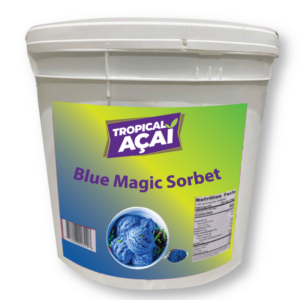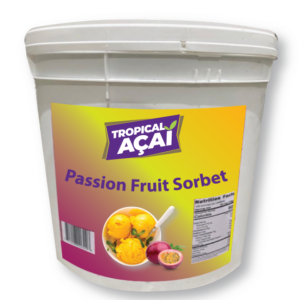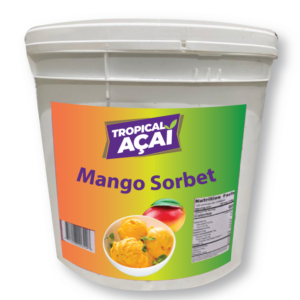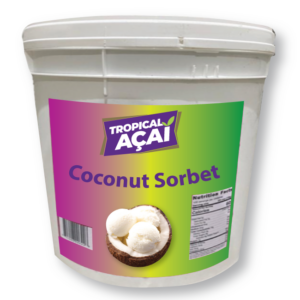Did you know the smoothie industry in the United States is a huge $3 billion market? With more people looking for healthy foods, it’s an excellent time to start a smoothie shop. As folks want quick, healthy meals, your smoothie business could really take off. The market for juices made from fruits and veggies is expected to hit $257 billion by 2025. This shows a big demand for healthy drinks. But, opening your shop takes lots of planning and some money. You might spend between $20,000 to $400,000 to start. Yet, you could make about $600,000 a year in sales.
Our company, Tropical Acai Wholesale Distributor and Bulk Supplier, wants to help you succeed. We offer great products like Organic Scoopable Acai, Organic Acai Sorbet, and Premium Pitaya Sorbet. By choosing the best ingredients, your shop can really stand out from the rest.
Key Takeaways
- The smoothie industry in the United States is a $3 billion market.
- The global fruit and vegetable juice market is expected to reach $257 billion by 2025.
- Initial startup costs for a smoothie shop range from \$20,000 to \$400,000.
- Estimated annual gross revenue for a smoothie business is around $600,000.
- Tropical Acai provides high-quality products to ensure your menu stands out.
II. Market Research: Understanding Your Audience and Competition
Starting a bowl or smoothie shop needs careful market research. You must understand who your customers are and the competition. Knowing your target market, looking at your rivals, and choosing the best place for your shop are key steps. We’ll explore how to lay a solid foundation for your business in this section.
Identifying Your Target Market
Knowing your target audience is crucial. They might be health-focused people, fitness lovers, or busy workers looking for quick, healthy meals. By learning about their food choices, shopping habits, and health routines, you can make sure your offerings meet their needs.
Analyzing Competition and Industry Trends
The smoothie market is highly competitive, with about 7,000 stores nationwide. It’s essential to see what your competitors do well and their weak spots to find your special spot in the market. Keeping up with trends, like the demand for organic and locally sourced items, keeps you ahead.
Look at successful companies like SoBol, with an average yearly store revenue of $594,000, even with Covid-19 challenges. Understanding their costs and investments gives you an idea of the money needed for your shop.
| Investment Item | Cost Range |
|---|---|
| Initial Investment | $240,800 – $450,600 |
| Franchise Fee | $30,000 |
| Construction & Improvement | $85,000 – $150,000 |
| Furniture & Equipment | $45,900 – $99,500 |
| Royalty Fee | 5% Net Sales |
| Brand Development Fee | 1% Net Sales |
Location Scouting and Demographics
Finding the right location involves looking at local demographics and where people walk or hang out. Ideal spots are near gyms, running paths, beaches, or areas with outdoor activities. This attracts health-minded customers to your shop.
Analyzing potential locations helps you understand their advantages and disadvantages. Think about rent costs, local demand, and other shops nearby. A good location helps attract customers continuously and achieve lasting success.
III. Developing a Business Plan
Creating a smoothie shop business plan is key when starting a bowl or smoothie business. It’s a guide for your journey and helps attract investors.
Executive Summary
The executive summary highlights your smoothie shop’s main vision and money-making potential. Talk about unique offerings like Organic Acai Sorbet or Organic Acai Puree Blender Packs from Tropical Acai Wholesale Distributor. Show how you expect to make money and grow, thanks to more people eating healthy.
Products and Services
Your menu is important for attracting customers. List what you’ll sell, like smoothies, acai bowls, juices, and health snacks. Make sure you have vegan and gluten-free items. You’ll use top-notch ingredients from places like Tropical Acai Wholesale Distributor for the best quality.
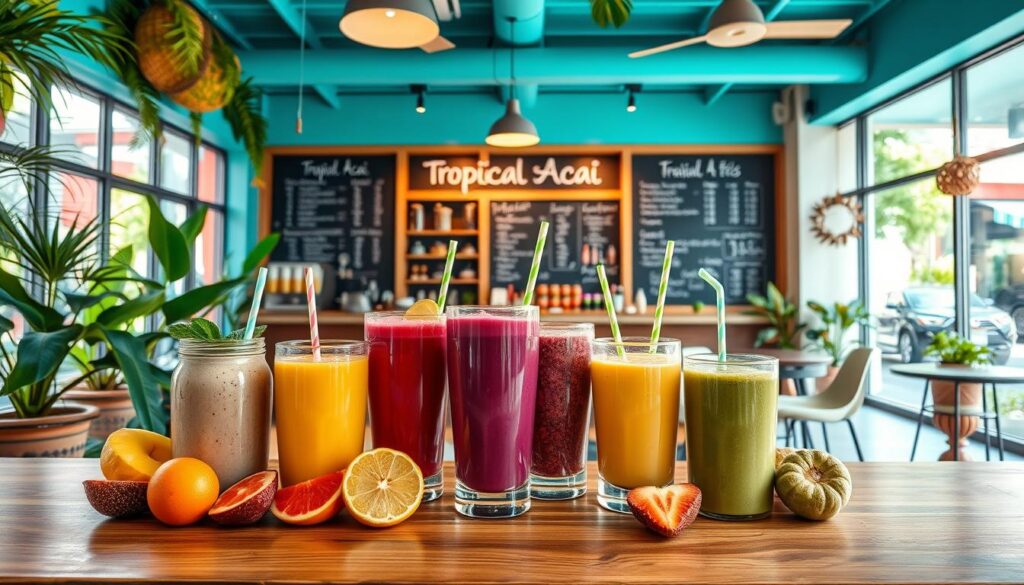
Business Model and Revenue Streams
This part explains how your shop will work and make money. You’ll look at sales in the shop, online, and catering. Having different ways to earn money means more stability and profit. For example:
- t
- In-store sales t
- Online orders t
- Catering services t
- Branded merchandise
Talking about various revenue ways shows your shop’s strong plan. Multiple sales paths help keep your business going. Plan on working closely with Tropical Acai Wholesale Distributor. This ensures top products like Premium Pitaya Sorbet and Organic Acai Puree satisfy customers.
With detailed planning, your smoothie shop business plan will not only be clear. It will also show your money goals and how your shop runs, drawing in investors and pushing your business to succeed.
IV. Menu Planning: Crafting a Winning Menu
Creating a great menu is key to your bowl or smoothie shop’s success. This guide helps you make an awesome acai bowl menu. It will include a mix of dishes that please everyone.
Designing the Core Menu
Acai bowls, smoothies, and health foods start off our menu. We use Organic Acai Blender Cubes, Premium Pitaya Sorbet, and Organic Acai Puree. You’ll see vegan, gluten-free, and low-sugar choices too.
- Acai Bowls: Acai bowls are full of antioxidants. We use top-notch organic acai puree for the best taste.
- Smoothies: We mix up unique blends. They have frozen fruits and Greek yogurt for extra protein. The right ingredients make our smoothies stand out.
- Healthy Snacks: Our menu includes granola bars, energy bites, and fresh fruit cups. They’re perfect for customers on the move.
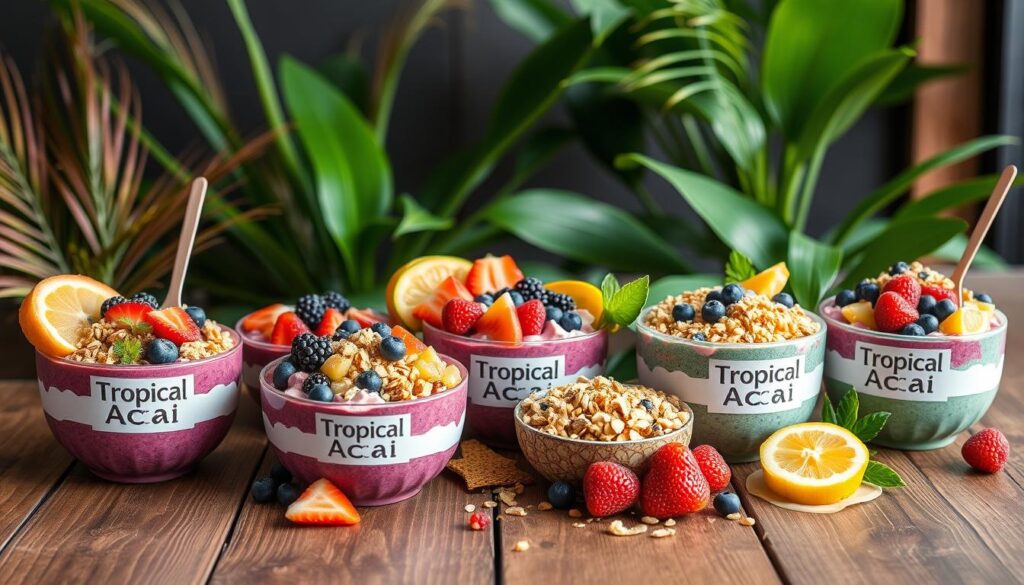
Sourcing Ingredients
Finding the best ingredients is vital. Tropical Acai Wholesale Distributor and Bulk Supplier is our go-to for acai and pitaya. With their Organic Acai Puree Blender Packs and Authentic Organic Acai Mix Pack, our acai bowls always impress.
Product Testing and Pricing
Testing our menu thoroughly is our next step. We use blind taste tests and customer feedback to perfect our dishes. Our pricing keeps our high-quality dishes affordable. The prices take into account the cost of getting organic ingredients.
| Product | Key Ingredients | Customer Feedback | Suggested Price |
|---|---|---|---|
| Classic Acai Bowl | Organic Acai Puree, Fresh Berries, Granola | Fresh, satisfying, well-balanced | $8.99 |
| Premium Pitaya Smoothie | Premium Pitaya Sorbet, Greek Yogurt, Honey | Creamy, unique, highly refreshing | $6.99 |
| Energy Bites | Oats, Nuts, Honey, Chocolate Chips | Delicious, energizing, perfect snack | $3.50 |
V. Securing Funding and Budgeting for Success
Starting a bowl or smoothie shop needs a solid grasp of initial costs and smart budgeting. It’s crucial for the success of your business. Think about leasing, equipment, starting inventory, and branding costs.
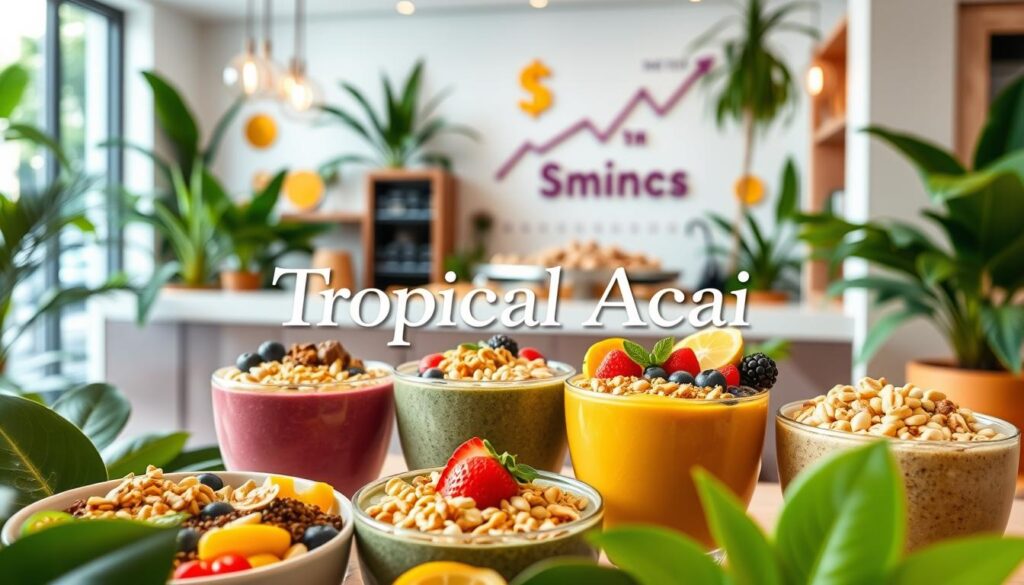
Estimating Startup Costs
Knowing your startup budget sets up for financial success. Factor in leasing, equipment, and starting inventory like Organic Scoopable Acai and Premium Frozen Pitaya Puree. Don’t forget about branding, marketing, and legal costs. These prepare you for a smooth start.
Funding Options
Look into various ways to fund your business. Options include small business loans, commercial loans, lines of credit, or crowdfunding. These can help with your startup expenses and keep your shop running well. For instance:
- Small Business Loans
- Commercial Loans
- Business Lines of Credit
- Crowdfunding
Creating a Financial Forecast
Forecasting your finances is key for planning cash flow and knowing when you’ll break even. Include expected earnings from in-store sales of items like Organic Acai Sorbet and Premium Pitaya Sorbet. Also consider partnerships and online sales.
| Revenue Source | Projection |
|---|---|
| In-Store Sales | $50,000 |
| Partnerships | $20,000 |
| Online Sales | $30,000 |
Good financial planning and securing the right funding options will make your business both successful and long-lasting.
VI. Legal Requirements and Permits
Starting a bowl or smoothie shop means more than making yummy, healthy snacks. You must also make sure you follow all legal steps. First, pick the type of business you want, like a Limited Liability Company (LLC). LLCs are great for small shops. They help with taxes and keep your personal stuff safe.
After choosing an LLC, you need to register your small business with the government. This gives you a unique number and sets up your tax info.
Business Structure and Registration
Picking an LLC can shield your personal assets and cut tax costs. Once you decide, register with both state and federal agencies. This is key for getting your Employee Identification Number (EIN). You need this for taxes. Registering lets you legally use your business name and gets you started.
Food Handling Permits and Health Regulations
If you’re opening a smoothie shop, following health rules is a must. Get food handling permits and meet health department rules. This means keeping everything clean and handling food safely. You will need regular checks and certifications to stay approved. Stick to these rules to avoid penalties and keep customers safe.
Handling products like Organic Acai Sorbet and Premium Pitaya Sorbet carefully is important. It helps maintain quality.
Licenses and Insurance
Getting the right licenses is crucial. You might need a business license, a foodservice license, and zoning permits. This is especially true if you’re building or making changes to your place. Also, pick the right insurance for your shop. This can include general liability or product liability insurance. Insurance protects you from unexpected legal problems.
Meeting legal requirements and getting permits can feel overwhelming, but it’s vital for your business’s success. By clearly understanding and following each step, you can build a strong legal base for your shop.
